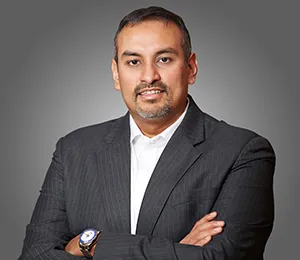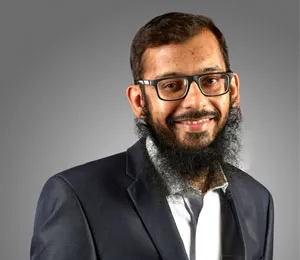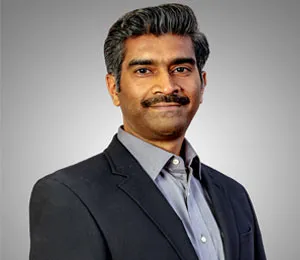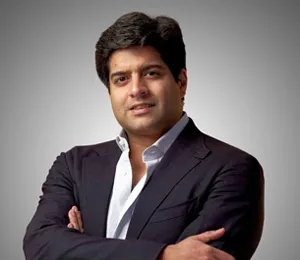A garage startup to Hollywood fame: How Namit Malhotra pivoted his way to success
Namit Malhotra’s grandfather M.N. Malhotra was a cinematographer who shot the first colour movie of India, Jhansi Ki Rani, in 1956. His father Naresh Malhotra was a film director. In the typical style of Bollywood kids, Namit knew he would grow up to be in the film business as well. Unlike most Bollywood kids however, he was born without a silver spoon and credits his massive successes today to tenacity, hustling and a consistently pro-risk attitude.

From starting up in a garage to having to mortgage his family home in order to secure funds for his business, Namit today is the CEO of Prime Focus Limited-the world’s largest integrated media services firm. His firm has provided the visual effects for movies ranging from Rockstar, Agent Vinod, Go Goa Gone to Avatar, Gravity, Clash of the Titans, X Men: First Class, Harry Potter and the Deathly Hallows 2, Hugo, Interstellar and many more. After earning many Academy Award nominations over the years, in 2014 the Prime Focus acquired company Double Negative won an Oscar for their work on Interstellar.

Today Prime Focus is based across sixteen cities in four continents and employs 5500 people. Namit spoke to YourStory about his unlikely beginnings as a teen entrepreneur, dropping out to co-found with his teachers (whom he lured with double the salary of what they were earning in their teaching positions), how pivoting constantly keeps him on his toes and why it always pays to be pro-risk.
How did your childhood shape your ambition?
I think it is natural for most kids born in the film industry to grow up and want to be a part of it. I always wanted to follow in the footsteps of my grandfather and father and become a film director.
You once said that someone convinced you post-production was like directing a movie and that's how you got into it. But then you found yourself at the helm of a tech startup at 18 instead. How did that happen?
It wasn't post production. It was computer graphics, which was just starting up then. Basically when you create CGI (Computer Generated Imagery), you end up having to use cameras, lights and storyboards. You are literally directing a shot in the computer and that's what was expressed to me as being very close to filmmaking. When I started, the realization quickly dawned that it was not what I had thought it to be. It required an entirely different set of skills and application. But it was exciting because it made me create something different and visually attractive every single day. Every job came with unique challenges. This appealed to me enormously.
What was it like starting up in 1995?
When we started back in 1995, I was 18 and had no film or school experience for that matter. It was the early days in which computer based systems were just starting to be used. So there was a lot of speculation on whether this would be the future, would computers replace traditional forms of the creative process. We ourselves didn't know the answer to this. We just had a gut feeling and acted upon it.
The first round of capital came from a bank loan that my father helped facilitate.
You said in an interview, 'Technology is the new creativity.' When you were just starting out, there were many uncertainties about the role of computers in creative fields. Now that you are heading this gigantic media tech firm, what is your philosophy on technology, creativity and the partnership in between?
At that point the challenge was how you can creatively achieve something that people were traditionally doing on hardware. Like on Black box hardware, which was then being replaced on the computer. So the computer was trailing the capabilities of a black box technology. We were always trying to measure up the creative process and the speed of what could happen on a predefined computer based system. Creativity was leading and technology was trailing. Where we are today, things have gone the other way completely. Creativity is down to literally, 'What can you think of? What can you imagine?' Technology today can deliver that seamlessly. Growth of technology has changed the course of the creative process. Today the limitation is back to the creative mind. It is about, what are we going to do next and not about can we do it.
Going back to 1995, you were 18 and you approached three of your teachers to be your co-founders. Why didn't you finish college instead? What was going on in your mind at the time?
I was a decent student growing up, but wasn't overtly attached to academics. In the film business the culture is to learn on the job by assisting established directors. That's how I wanted to learn. In those days if you wanted to get a film degree from FTII or someplace like that, you still needed an undergraduate degree. But I didn't want to go to college every day and study B.Com or something. Whatever I study, it should take me forward in my chosen path. College was not going to be it.

I enrolled in a computer graphics course. As I went through it I realized that I wasn't good at it. I could see how it was done. I could understand things much better after studying it. But I personally was not good at the artistic side of it. It dawned on me that the guys who were teaching me- They were really good! Why don't I hire them? I could take care of the business side of things.
Usually when friends come together to create a startup, there is a lot of concern about how friendships can be sustained in a cutthroat business environment. In your case of a student teacher dynamic, the hierarchy puts you at the bottom of the power structure. That hierarchy is turned topsy turvy when you became the boss. What was the chemistry between you guys like?
We used to joke about this. I first approached Huzefa Lokhandwala and Prakash Kurup to join me. As their student, I saw Huzefa as this crazy scientist genius. He spoke little, worked super-fast and was a simple straightforward person. Prakash was the friendliest and most easy going character I'd ever met. Merzin Tavaria was the bossier fellow who would show me his watch every time I came late.
I initially asked only Huzefa and Prakash to join me. Merzin intimidated me. But those two convinced me to invite him onboard. We all went out, had a chat and I told them all about the technology I wanted to buy. They became excited and decided to give this a shot. They were making two thousand rupees in their job. I offered them four thousand rupees. We just got going from there.
From starting up in a garage to now, take us through the journey of Prime Focus in a nutshell.
When we started, we didn't know technology. We didn't know anything. We literally started in a car garage and called ourselves Video Workshop. We taught ourselves and started to do some good creative work in the process. Gradually we worked on TV serials. That got us some good traction in the market because people felt that we had this new way of doing things. Satellite television was just starting up then, so they wanted to do different kinds of colorful graphics, packaging and title sequences and music videos.

Since we were one of the first players in the digital field, it worked to our benefit. But it was also our greatest disadvantage. Every time new technology comes, a bunch of people get obsolete. We were met with resistance at every turn, constantly told that our way was not the way of doing things. But we stayed on our tracks and delivered on our terms.
As we started to do well in television, we expanded very quickly from a one room garage to a two room garage and then a six room studio in 1996. In 1997, when we decided that it was time to take the next step and open up our advertising business, Prime Focus was born. I turned 21 that year.
We decided to upgrade the level of technology we had so we could do more than cater to the list of services we were providing. Our turnover was 75 lakhs and the investment was 2 crores. The equipment we bought was three times the value of our revenue. Even at 21, I knew that was the biggest risk I would ever take in my life because I put my entire family- whatever we had (one house is all we had in Mumbai) - on the line to get that loan. But we also knew that if things worked out then the financial upside would put us in another league altogether. So we took this call. Of course nothing comes easy. We fought hard. We were not even in the vicinity of advertising. The hub of advertising was south Mumbai and we were in the suburbs. Interestingly today advertising as an industry has moved from south Mumbai to Khar, which is where Prime Focus was in 1997.
Between 1997 and 2006, Prime Focus really took off.

Once that investment started to play out, that gave us phenomenal growth. We grew big in films, in advertising and music videos. Television started to become bigger in India. In 2000 we launched one of the first colour correction machines in the country. In 2001 we started doing film scanning and recording. In 2003 we did the first DI (Digital Intermediate) in Asia. In 2004-05 we started to launch our visual effects program and set up a complete facility in Film City, Adlabs. That same year Reliance Capital came in and invested in us. In 2006 we did our IPO, for which we decided to go international.
After the IPO, you focused intensely on pivoting.
In 2007, after we expanded all over India and internationally, the next question that came to our mind was that how do we incubate our company? We had been buying a lot of technology from vendors worldwide. We were at the place where we were deeply embedded in the digital ecosystem. We now needed to create our own technology to manage how content gets digitized, distributed, archived, re-purposed and delivered. We went about assembling a team, going back to work with vendors who had assisted us back in 1997.
In two years we had come about launching our end to end digital platform. We launched worldwide in 2009. Meanwhile we were struggling with our businesses in Hollywood and London because of the financial recession. Looking back, that was the real turning point of our business because that is when our international strategies started to play out. But play out against what we had thought.
Was Clash of the Titans your first big break in Hollywood?
The kind of companies that I was looking at buying had something new to do with technology. `This company we bought- Frantic Films VFX- they were just about doing some work in 3D on a movie called Journey to the Centre of the Earth. I became fascinated with 3D as a new technology (anything that's new keeps me very interested). That led us to Avatar. Prime Focus was the fourth largest vendor on Avatar. Avatar's success brought about significant visibility for us in Hollywood. When Warner Brothers called us and asked that we've got eight weeks to turn this movie into 3D and whether we could do it, we jumped at the chance.
From being established in Bollywood to earning a foothold in Hollywood, what were the learnings and challenges you encountered along the way?
When time came to move to Hollywood, we didn't go just as any other company. I was very clear that Hollywood is the industry and we wanted to go with some credibility and size. So in 2007 we were probably in our biggest scale as a company- in terms of market valuation and financial position. We were optimistic of making a mark right away.

But what followed is that the breakdown of the film industry with the writers’ strike. Then the Lehman Brothers recession shook the financial world and completely threw us off. Suddenly the number of projects shrunk- from making 300 movies a year, they were down to 150. Being there at that time and not being among the top tier companies, we clearly lost crucial opportunities.
The other thing I realized about coming to America and working in Hollywood is that it did not matter whatsoever that I had done 300 movies in India by then. We had to start from scratch. We told people that we know what we are doing, that we had done it in a tough market like India. But no one would not trust that. After the financial crash, taking a risk on an unknown entity, like me, was too high. But I had realized that this was going to be my make it or break it time. Either I come to America personally and drive it, or I pack up my business here altogether. There is no half way of doing it.
So in August of 2010 I moved here with my family and have been here since then, trying to make it work.
And it's working. You are doing really well. Prime Focus has an Academy Award under its belt.

(Laughing) I can't complain. But it's not been easy. The challenges are high still because we continue to grow our aspirations along with our ambitions. I still like to believe that we are the underdogs who are fighting the battle all the time. I am not somebody who can rest on my laurels or take it easy.
How would you describe your style of leadership?
I think I am driven to be competitive. So my style of leadership is more strategic than one that focuses on the process of the day to day functions. I am risk prone and expect the same 'Can Do' attitude from my team. I have tremendous belief in the potential of what people can do and constantly take chances on those who I think will rise to the occasion. Most times they do. Sometimes they don't. You live and learn. But in general, I have a deep trust in my employees. I was once an eighteen year old who didn't know anything. If I could get here, then why wouldn't I have a similar outlook when it comes to others?
I want to cut through all that hierarchical structure and keep it much more dynamically driven.
In retrospect, what would you say have been your biggest mistakes and failure?
I think we made our worst mistake in 2007 when we decided to raise the capital that we did. Out of almost ignorance, I would say, we raised about $55 million to do our international acquisitions. We raised it thinking we were raising equity and it turned out to be debt. We had to pay back the entire amount, which we did. But that put tremendous pressure and added a huge amount of fear into the company because everybody saw how we were experimenting with something we didn't really know about. The subsequent financial crisis put us in an extremely hard place.
I think my other mistake was that we grew too big too fast. We literally went from one and a half facility in Mumbai in 2006 to 14 facilities by end of 2007.
How was that a mistake, given the kind of risk driven growth and ambition you espouse?
When you grow that fast and the whole world falls apart (referring to the Wall Street Crash), in retrospect it becomes a mistake. I was much more gung-ho because the times were good and we actually believed that we could operate in Chennai, Hyderabad, London, Los Angeles, Canada, etc. We thought operating across so many different areas and diversities would de-risk our business. It turned out that when the global crisis hit, all the businesses got hit at the same time. We hadn't scaled up our leadership teams or got enough people to run those businesses. When you think about it, it's being prepared for the bad times that determine your mettle as an entrepreneur.
From 1995 to 2007 we were growing every year. We didn't know what failure felt like. When it hit for the first time, even though it was not our fault, we were at the receiving end of losses we had never experienced. In retrospect, it was a mistake. While I was doing it, naturally it didn't seem like one.
Since you continue to grow just as aggressively, are you more confident of the market now?
I don't like the term growth. I call it evolution because I want us to be people who have a pulse on technology, on what's happening around the world, on what our customers are thinking about, what is the next phase of their vision and how can we be a part of that. For me that growth is to make sure that the evolution curve is always on the rise. More money or less money is part of the game. Because if we stop evolving but make a lot of money, even then we go obsolete. Lots of companies have done that in the past. It is a fate I actively want to avoid.
What is your advice to aspiring entrepreneurs?
The first thing I would tell somebody who wants to do something on their own is to have self-realization. It is a complicated concept but people have to know internally, with the strongest sense of conviction, what they want. Not what they like. This is not just a trade you are doing. For people who start up, you give your company a name. You stand behind it when somebody criticizes it. You fight to make it better every day. The reason you are willing to go through all that pain is because you want satisfaction money cannot give. Money is a by-product if you are doing your job well. You can make a disproportionate amount of money. You can lose a disproportionate amount of money. Both things happen in business.
This is not charity that we are doing. Our work is a reflection of our spirit. We compromise everything else in life to stand behind our companies, to defend the choices that define our spirit. We do that because we need that more than anything else.







